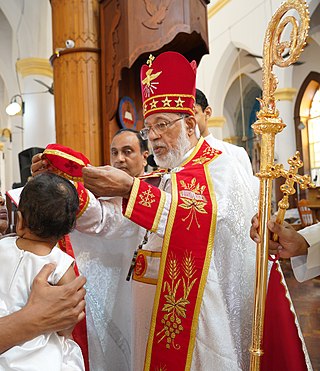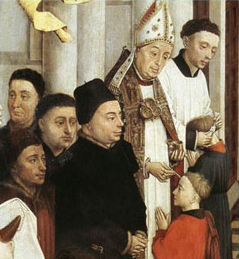Related Research Articles

Anointing of the sick, known also by other names such as unction, is a form of religious anointing or "unction" for the benefit of a sick person. It is practiced by many Christian churches and denominations.

The last rites, also known as the Commendation of the Dying, are the last prayers and ministrations given to an individual of Christian faith, when possible, shortly before death. They may be administered to those awaiting execution, mortally injured, or terminally ill. Last rites cannot be performed on someone who has already died. Last rites, in sacramental Christianity, can refer to multiple sacraments administered concurrently in anticipation of an individual's passing.

Transubstantiation is, according to the teaching of the Catholic Church, "the change of the whole substance of bread into the substance of the Body of Christ and of the whole substance of wine into the substance of the Blood of Christ". This change is brought about in the eucharistic prayer through the efficacy of the word of Christ and by the action of the Holy Spirit. However, "the outward characteristics of bread and wine, that is the 'eucharistic species', remain unaltered". In this teaching, the notions of "substance" and "transubstantiation" are not linked with any particular theory of metaphysics.
Presbyterianpolity is a method of church governance typified by the rule of assemblies of presbyters, or elders. Each local church is governed by a body of elected elders usually called the session or consistory, though other terms, such as church board, may apply. Groups of local churches are governed by a higher assembly of elders known as the presbytery or classis; presbyteries can be grouped into a synod, and presbyteries and synods nationwide often join together in a general assembly. Responsibility for conduct of church services is reserved to an ordained minister or pastor known as a teaching elder, or a minister of the word and sacrament.

Chrismation consists of the sacrament or mystery in the Eastern Orthodox, Oriental Orthodox and Eastern Catholic churches, as well as in the Assyrian Church of the East initiation rites. The sacrament is more commonly known in the West as confirmation, although Italian normally uses the term cresima ("chrismation") rather than confermazione ("confirmation").

Donatism was a Christian sect leading to a schism in the Church, in the region of the Church of Carthage, from the fourth to the sixth centuries. Donatists argued that Christian clergy must be faultless for their ministry to be effective and their prayers and sacraments to be valid. Donatism had its roots in the long-established Christian community of the Roman province Africa Proconsularis, in the persecutions of Christians under Diocletian. Named after the Berber Christian bishop Donatus Magnus, Donatism flourished during the fourth and fifth centuries.

The Test Acts were a series of English penal laws that served as a religious test for public office and imposed various civil disabilities on Roman Catholics and nonconformists. The underlying principle was that only people taking communion in the established Church of England were eligible for public employment, and the severe penalties pronounced against recusants, whether Catholic or nonconformist, were affirmations of this principle. Similar laws were introduced in Scotland with respect to the Presbyterian Church of Scotland. In practice nonconformists were often exempted from some of these laws through the regular passage of Acts of Indemnity: in particular, the Indemnity Act 1727 relieved Nonconformists from the requirements in the Test Act 1673 and the Corporation Act 1661 that public office holders must have taken the sacrament of the Lord's Supper in an Anglican church. Except at Oxbridge, where nonconformists and Catholics could not matriculate (Oxford) or graduate (Cambridge) until 1871, they were seldom enforced after 1800 and the Tory government repealed them in 1828 with little controversy.

Penance is any act or a set of actions done out of repentance for sins committed, as well as an alternate name for the Catholic, Lutheran, Eastern Orthodox, and Oriental Orthodox sacrament of Reconciliation or Confession. It also plays a part in confession among Anglicans and Methodists, in which it is a rite, as well as among other Protestants. The word penance derives from Old French and Latin paenitentia, both of which derive from the same root meaning repentance, the desire to be forgiven. Penance and repentance, similar in their derivation and original sense, have come to symbolize conflicting views of the essence of repentance, arising from the controversy as to the respective merits of "faith" and "good works". Word derivations occur in many languages.
Confessor is a title used within Christianity in several ways.

Eucharistic adoration is a Eucharistic devotional practice primarily in Western Catholicism, but also to a lesser extent in certain Lutheran and Anglican traditions, in which the Blessed Sacrament is adored by the faithful. This practice may occur either when the Eucharist is exposed, or when it is not publicly viewable because it is reserved in a place such as a church tabernacle.

Anglican eucharistic theology is diverse in practice, reflecting the comprehensiveness of Anglicanism. Its sources include prayer book rubrics, writings on sacramental theology by Anglican divines, and the regulations and orientations of ecclesiastical provinces. The principal source material is the Book of Common Prayer, specifically its eucharistic prayers and Article XXVIII of the Thirty-Nine Articles. Article XXVIII comprises the foundational Anglican doctrinal statement about the Eucharist, although its interpretation varies among churches of the Anglican Communion and in different traditions of churchmanship such as Anglo-Catholicism and Evangelical Anglicanism.

Confirmation, in the Catholic Church, is one of the seven sacraments. It is also one of the three sacraments of initiation into the Catholic Church, the other two being Baptism and Holy Communion.
The Sacrament of Penance is one of the seven sacraments of the Catholic Church, in which the faithful are absolved from sins committed after baptism and reconciled with the Christian community. During reconciliation mortal sins must be confessed and venial sins may be confessed for devotional reasons. According to the dogma and unchanging practice of the church, only those ordained as priests may grant absolution.
Tametsi is the legislation of the Catholic Church which was in force from 1563 until Easter 1908 concerning clandestine marriage. It was named, as is customary in Latin Rite ecclesiastical documents, for the first word of the document that contained it, Chapter 1, Session 24 of the Council of Trent. It added the impediment of clandestinity and established the canonical form of marriage for validity in the regions in which it was promulgated.

In the Catholic Church, the anointing of the sick, also known as Extreme Unction, is a Catholic sacrament that is administered to a Catholic "who, having reached the age of reason, begins to be in danger due to sickness or old age", except in the case of those who "persevere obstinately in manifest grave sin". Proximate danger of death, the occasion for the administration of Viaticum, is not required, but only the onset of a medical condition of serious illness or injury or simply old age: "It is not a sacrament for those only who are at the point of death. Hence, as soon as anyone of the faithful begins to be in danger of death from sickness or old age, the fitting time for him to receive this sacrament has certainly already arrived."
In the canon law of the Catholic Church, excommunication is a form of censure. In the formal sense of the term, excommunication includes being barred not only from the sacraments but also from the fellowship of Christian baptism. The principal and severest censure, excommunication presupposes guilt; and being the most serious penalty that the Catholic Church can inflict, it supposes a grave offense. The excommunicated person is considered by Catholic ecclesiastical authority as an exile from the Church, for a time at least.

There are seven sacraments of the Catholic Church, which according to Catholic theology were instituted by Jesus and entrusted to the Church. Sacraments are visible rites seen as signs and efficacious channels of the grace of God to all those who receive them with the proper disposition.

A sacrament is a Christian rite that is recognized as being particularly important and significant. There are various views on the existence, number and meaning of such rites. Many Christians consider the sacraments to be a visible symbol of the reality of God, as well as a channel for God's grace. Many denominations, including the Catholic, Lutheran, Anglican, Methodist, and Reformed, hold to the definition of sacrament formulated by Augustine of Hippo: an outward sign of an inward grace, that has been instituted by Jesus Christ. Sacraments signify God's grace in a way that is outwardly observable to the participant.
In the Catholic Church, communicatio in sacris, also called communicatio in divinis or communicatio in ritibus, designates the regulations for the partaking of a Catholic person to a non-Catholic sacrament or liturgical celebration, or for the partaking of a non-Catholic person to a Catholic sacrament or liturgical celebration. The expression is also used to refer to said acts of partaking themselves.
Stercoranism is a supposed belief or doctrine attributed reciprocally to the other side by those who in the eleventh century upheld and those who denied that the bread and wine offered in the Eucharist become in substance, but not in form, the body and blood of Jesus Christ.
References
- 1 2 M’Clintock, John; Strong, James (1885). "Clancularii". Cyclopædia of Biblical, Theological, and Ecclesiastical Literature . Vol. Supplement Vol. 1, A–CN. New York: Harper & Brothers. p. 957. OCLC 174522651.